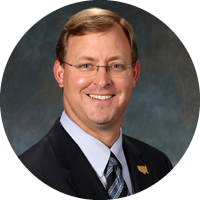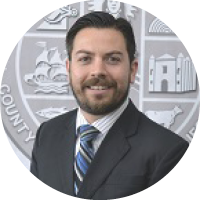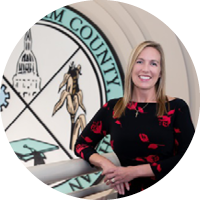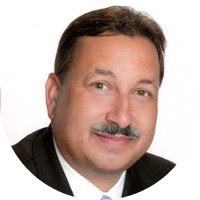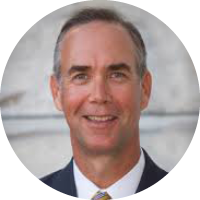As Barb Byrum’s third and final term in the Michigan House of Representatives was coming to an end, she faced a daunting question – what now? For Byrum, this question was not a matter of whether to continue her career in public service, but how. As the daughter of former House Minority Leader Dianne Byrum, Barb’s desire to serve her community ran deep.
As such, Byrum decided to run for the position of Ingham County Clerk in 2012. Byrum, having served on the House Committee on Redistricting and Elections, was uniquely positioned to enter the field of election administration. Having owned a local hardware store in southwestern Ingham County, serving as County Clerk would not only allow her to serve her local community but also build her neighbors’ faith in the electoral process.
Following a successful campaign, Byrum joined the ranks of the approximately 1,500 individuals tasked with administering elections at the county, local and township level in Michigan. As chief election official, Byrum has spearheaded her jurisdiction’s efforts to train election workers, program ballots and tabulators, coordinate and create precinct supplies as well as report and audit election results, among other duties. She is a Certified Elections Registration Administrator (CERA) with the National Association of Election Officials’ Election Center and has hosted the Ingham County Election Administration Academy.
Notable among these achievements is Byrum’s handling of the recount of the 2016 presidential election results. Following the election, Green Party candidate Jill Stein requested a recount of all votes cast in Michigan. Byrum successfully organized the transfer of the approximately 136,000 ballots cast in Ingham County to a central location to be counted by hand. With the help of approximately 60 election workers, the recount was completed in just over two days, making Byrum’s jurisdiction among the first to report their results. According to Byrum, the contributions of Ingham County’s election workers to this effort cannot go without recognition.
Unique among Byrum’s endeavors as County Clerk have been her continued efforts to foster transparency and educate the public about the conduct of elections. Her office routinely disseminates newsletters via email and implements updates to the Clerk’s website in order to ensure that officials’ contact information is up-to-date and that information regarding registration and ballots is easily accessible.
Among her constituents and the wider election community, Byrum has become known for her active presence on Twitter and her use of the platform to combat election misinformation by disseminating fact-based narratives. She often retweets articles from credible sources and shares links to heavily cited blogs and primary source documents. As of March 2021, Byrum had amassed a following of just over 8,000 accounts.
For Byrum, her presence on social media is not only intended to educate but engage future generations of election administrators. According to Byrum, “…the more people that truly understand election administration and can articulate the many procedures to secure our elections, can counter the narrative that our elections are not safe and secure.”
Often, traditional news media outlets portray election officials solely in terms of their professional duties. This can leave voters with a one-dimensional view of election administrators, devoid of the personal details that cultivate their reputation as working professionals and integral members of their communities. The absence of such details online poses a challenge to election officials when attempting to build trust and rapport with the voters they serve.
Byrum has faced this challenge head-on through her social media presence. The Clerk’s posts demonstrate her passion for running, social activism and family as well as her lively sense of humor. She is most notable for her joke of the day accompanied by the hashtag “JokeThenVote*.” These punchy one-liners have proven effective at engaging voters and other election officials alike, with a growing number of replies, retweets and likes per post.
Furthermore, Byrum has leveraged her social media platforms to engage policymakers in dialogue surrounding the conduct of elections. Byrum’s tenure in the state legislature has acted as the impetus for these efforts, demonstrating the need for enhanced and sustained dialogue between election administrators and elected officials.
As an administrator, Byrum has witnessed first-hand the negative impact of constrained budgets on city and township clerks as well as the challenges posed by unreliable rural broadband and the enhanced public scrutiny of elections. For example, it is not uncommon for local clerks in Ingham County to use a nearby McDonald’s Wi-Fi network to transmit election night results and download/send ballots to uniformed and overseas citizen absentee (UOCAVA) voters given the lack of a reliable internet connection in their office.
According to Byrum, this has led increasingly to burnout among her staff and fellow election officials throughout the state. As such, these issues are frequent topics of conversation between Byrum and Michigan’s legislators. She frequently attends coffee hours with state policymakers and has testified in front of numerous legislative committees to ensure these issues are not overlooked. In Byrum’s view, “legislators are going to decide on election policy, and they’re either going to do it with us, or without us. I believe it’s in the best interest of the state to join with us, or at least to bring us along even when disagreeing adamantly.”
Although election administration is one among many of Byram’s duties as Clerk, she has never faltered in her commitment to serving Ingham County voters. This commitment has garnered the respect of her colleagues throughout the state and will continue to benefit Michigan’s voters long after her tenure in office. To keep up-to-date with Byrum’s efforts, follow her on Twitter, TikTok and Facebook at @BarbByrum.
*For example, on Monday, April 5th Byrum tweeted, “When is the saddest part of the week? Monday mourning. #JokeThenVote.”
